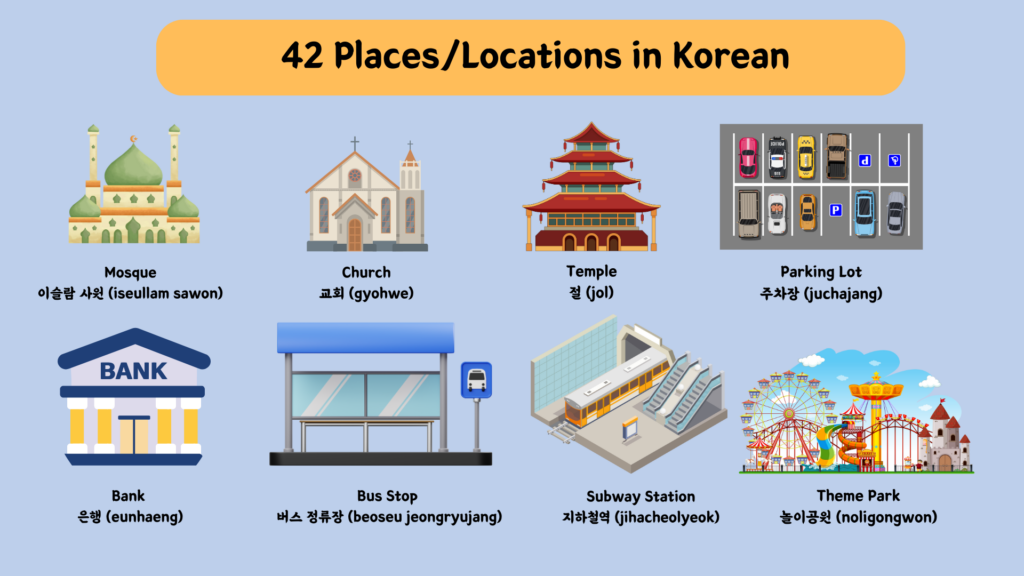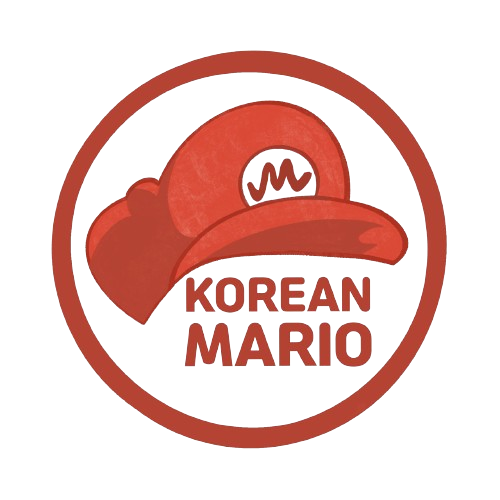
Learning location vocabulary words in Korean is crucial because they help you navigate and communicate effectively in various situations. Whether you’re traveling, living, or working in Korea, knowing how to express where you are, where you want to go, or where something is located enables smoother interactions and enhances your overall experience. Plus, understanding location terms allows you to engage more deeply with Korean culture and explore its fascinating landmarks, cities, and natural wonders with confidence and ease.
In this lesson, we’ll dive into essential words and phrases that will help you describe where things are and navigate your surroundings in Korean-speaking environments.
Learning location vocabulary is crucial for effective communication in everyday situations, whether you’re asking for directions, describing places, or simply having a conversation about where you’ve been or where you want to go.
Let’s get started by exploring some basic location words and phrases. Ready? Let’s begin!
Korean Word for “Places” or “Location”
“장소” (jang-so) is the Korean word for “places” or “location.” It refers to physical or geographical areas, whether they are specific destinations, landmarks, venues, or any other identifiable spots. In everyday conversation, “장소” (jang-so) can be used to discuss various places such as parks, restaurants, schools, offices, or any location you might refer to or want to visit. It’s a versatile term that encompasses a wide range of places, making it essential for describing and navigating different environments in Korean.
List of Locations in Korean

Home
집 (jip)

School
학교 (hakgyo)

Bank
은행 (eunhaeng)

Restaurant
식당 (sikdang)

Park
공원 (gongwon)

Hospital
병원 (byeongwon)

Mart/Market
마트 (mateu)

Library
도서관 (doseogwan)

Museum
박물관 (bakmulgwan)

Cinema/Movie Theater
영화관 (yeonghwagwan)

Airport
공항 (gonghang)

Bus Stop
버스 정류장 (beoseu jeongryujang)

Subway Station
지하철역 (jihacheolyeok)

Cafe
카페 (kape)

Hostel
숙소 (sukso)

Golf Course
골프장 (golpeujang)

Swimming Pool
수영장 (suyoungjang)

Gym
헬스장 (haelseujang)

Gas Station
주유소 (juyuso)

Highway
고속도로 (gosokdoro)

Mountain
산 (san)

River
강 (gang)

Bridge
다리 (dari)

Construction Site
공사장 (gongsajang)

Department Store
백화점 (baekhwajeom)

Rooftop
옥상 (ogsang)

Building
건물 (geonmul)

Office
사무실 (samusil)

Apartment
아파트 (apateu)

Casino
카지노(kajino)

Church
교회 (gyohwe)

City Hall
시청 (sicheong)

College/University
대학교 (daehakgyo)

Pharmacy
약국 (yaggug)

Embassy
대사관 (daesagwan)

Mosque
이슬람 사원 (iseullam sawon)

Club
클럽 (keullab)

Parking Lot
주차장 (juchajang)

Store
가게 (gage)

Temple
절 (jol)

Travel Agency
여행사 (yeohaengsa)

Zoo
동물원 (dongmulwon)

Theme Park
놀이공원 (noligongwon)

Barber Shop
이발소 (ibalso)

Police Station
경찰서 (gyeongchalseo)

Fire Station
소방서 (sobangseo)

Company
회사 (hwesa)

Convenience Store
편의점 (pyeonuijeom)

Toilet
화장실 (hwajangsil)
Phrases to Ask About Places in Korean
Here are some phrases you can use to ask about places in Korean:
- Where is X?
🔊 X 어디에 있어요? (X eodie isseoyo?) - Is there a X nearby?
🔊 이 근처에 X 있어요? (i geuncheo-e X isseoyo?) - How do I get to X?
🔊 X 어떻게 가요?” (X eotteohge gayo?) - Until what time is X open?
🔊 X 몇 시까지 영업하나요? (X myeot shikkaji yeongeophanayo?)
Replace ‘x’ with any location word you’ve learned above, and you’ll be able to ask questions about various places in Korea with ease!
Conclusion
In conclusion, mastering location vocabulary in Korean is crucial for effective communication and navigation in various situations. Whether you’re traveling, living, working, or simply engaging with Korean culture, knowing how to express where things are and understand directions enhances your overall experience. With words like “location” (“위치” – wi-chi) and “places” (“장소” – jang-so), you can confidently describe destinations, landmarks, and venues, making interactions smoother and more fulfilling. So, by expanding your Korean location vocabulary, you’re not just learning words; you’re gaining the key to unlocking countless opportunities and enriching your connection with the Korean language and culture.
Table of Contents

